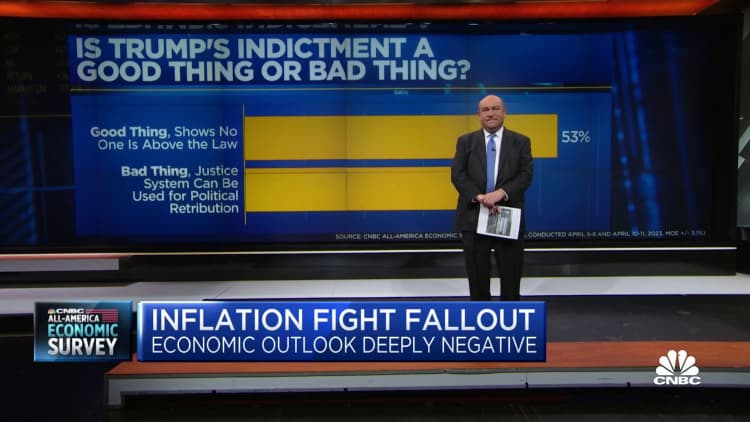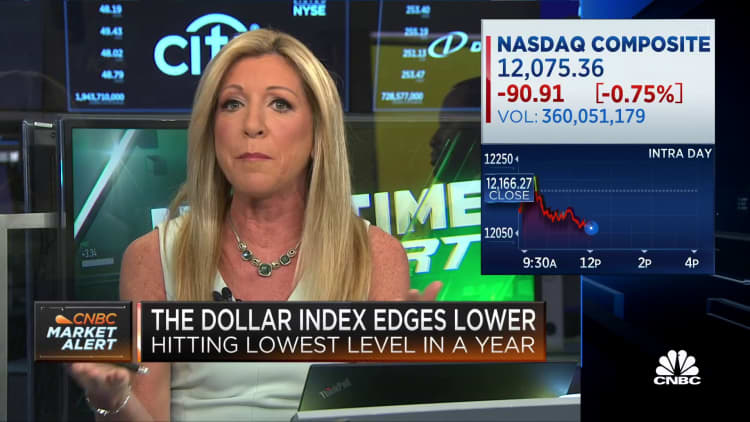
In the middle of consistent inflation, greater rate of interest and economic crisis concerns, Americans have actually never ever been more unfavorable about the economy, according to the most recent CNBC All-America Economic Study.
A record 69% of the general public holds unfavorable views about the economy both now and in the future, the greatest portion in the study’s 17-year history.
The study of 1,000 individuals across the country, with a margin of mistake of +/ -3.1%, discovered that about two-thirds of Americans state their incomes are falling back inflation, and two-thirds state the country is headed for economic crisis or currently in one.
The fallout from these unfavorable views is striking President Joe Biden‘s approval score.
His total score fell by 2 portion indicate 39% and his displeasure score increased by an indicate 55% compared to the November study.
Americans Biden’s handling of the economy by a 62% to 34% margin, a degeneration from the 57% to 38% margin in the last study. It was the second-worst reading of his presidency on the economy.
Extensive displeasure
Biden lost assistance from a number of essential groups.
General approval from Democrats dropped 2 indicate 77% compared to a year back and by 9 points for independents to simply 27%.
” It’s clear that as much as there is a partisan overlay to individuals’s mindsets, everyone is likewise feeling the capture consisting of Democrats which’s dismal numbers with the base,” stated Jay Campbell, partner at Hart Research study, the study’s Democratic pollster.
The only silver lining, he stated, is Biden has time to fortify his base prior to the next election.
” One group that I believe is specifically essential to watch on is females 18 to 49, a really fundamental part of the Democratic union,” stated Micah Roberts, partner at Popular opinion Techniques, which works as the study’s Republican pollster. “They have they have actually seen an enormous drop in regards to their financial approval.” The score for that metric dropped 13 points compared to last quarter to 34%.
There were a couple of intense areas in the information.
In spite of the unfavorable views on the economy, 63% of utilized Americans are not fretted about losing tasks, up 5 points from November. And 37% of participants anticipate their incomes to increase in the next year, a bit above the average of the previous a number of years.
Yet a lot of Americans do not feel their incomes enable them to stay up to date with inflation
Simply 5% state their home earnings is growing quicker than inflation, 26% state it’s keeping up and 67% report they are falling back.
Altering habits
Due to the fact that of inflation, big bulks state they are changing their costs and way of lives.
Completely 81% of participants state they are taking some action, such as investing less on home entertainment, taking a trip less or utilizing cost savings to spend for purchases.
The study discovered that the results are not expanded similarly.

Approximately three-quarters of self-described working-class Americans state they are cutting down on home entertainment and eating in restaurants to save money due to inflation; that compares to 54% of upper-middle-class Americans.
Some 51% of the working class state they are working more to make ends fulfill, compared to simply 18% of the upper middle class. Likewise, 24% of Black Americans state they are struck hardest by high real estate rates, compared to 12% of white Americans.
In General, 54% of Americans stated the increase in food rates had actually impacted them the hardest, a portion constant throughout racial groups, political celebration and earnings, though it seems more severe for rural compared to city occupants and for females compared to males.
The gush of unfavorable financial views overflows into American views on the stock exchange
Simply 24% state now is a great time to purchase stocks, the most affordable reading in the study’s 17-year history. The previous record was last quarter at 26%.
However 1 in 5 grownups have actually taken some action to take advantage of greater rates, either moving savings account, purchasing a cash market fund or buying a CD. A bulk of Americans state they are less most likely to purchase an automobile or a brand-new house due to greater rate of interest.
Correction: Pessimism on the economy has actually struck a brand-new high. An earlier heading was inaccurate.